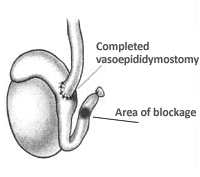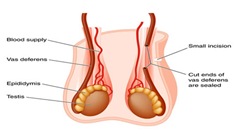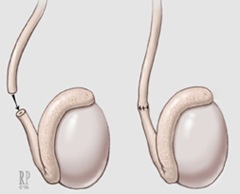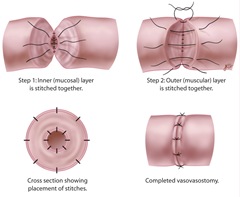Vasectomy Reversal (Vasovasostomy) Is it Right for Me?
Usually when a man has a vasectomy, it is thought of as a permanent form of birth control, yet it is reversible in many cases, depending upon some variables. Vasectomy reversal also referred to as Vasovasostomy involves the reconnection of the vas deferens tubes which were cut during the vasectomy.
A vasectomy reversal generally doesn’t require an overnight stay in the hospital and general or spinal anesthesia is used so the patient is able to stay still during the procedure.
How successful your vasectomy reversal is depends upon how much time has passed between the time of the vasectomy and the reversal, your physical health, and whether or not a blockage or scar tissue has developed in the vas deferens.
Vasectomy reversals are more complicated than the vasectomy and if there is a blockage then this will require correction, which is called a Vasoepididymostomy.
What to Expect After Vasectomy Reversal Surgery
Vasectomy reversal usually takes from 2 to 4 hours, followed by a few more hours for recovery from the anesthetic. Your blood pressure will be monitored and you can to go home the same day. Your pain level may be mild to moderate, your urologist will give you a prescription for a two day supply of pain medication, after the two day period, you can take an over the counter pain medication, such as Tylenol. Within 3 days you may return to light activity such as short walks, or working at a desk, all strenuous activity should be avoided until your urologist gives you the okay, usually within 3 weeks. After that you should be able to resume normal activities, including sex.
How successful are Vasectomy Reversals?
Chances of a successful vasectomy reversal decline over time. Reversals are more successful during the first 10 years after vasectomy, but there is no absolute timeline for a vasectomy reversal, some have been successful after 15 years.
In general, a vasectomy reversal leads to a pregnancy rate of greater than 50 to 75 percent; you have the greatest chance of success if you have the reversal done within 3 years of the vasectomy. If the reversal is done 10 years after vasectomy the odds of pregnancy success is only about 30 percent, so time is a factor.
What are the Risks of Vasectomy Reversal Surgery?
The surgical risks associated with a vasectomy reversal are low, but they may include: an infection at the site of the incision, fluid buildup and swelling in the scrotum that may require draining and a possible injury to the arteries or nerves in the scrotum. Call our office immediately if you are experiencing increased bleeding, pain or develop a fever.
A vasectomy reversal is an important decision and you need the most experienced and skilled urology surgeon available. So if you are considering a vasectomy reversal and wish some more information, call us today to make an appointment to see the best vasectomy reversal urologist in NYC.


 deferens are reconnected. This is done after an examination of the vas fluid. The vas fluid is examined under a microscope and it is determined if the fluid is of good quality, clear and non-opaque with completely formed, healthy and active sperm.
deferens are reconnected. This is done after an examination of the vas fluid. The vas fluid is examined under a microscope and it is determined if the fluid is of good quality, clear and non-opaque with completely formed, healthy and active sperm.

